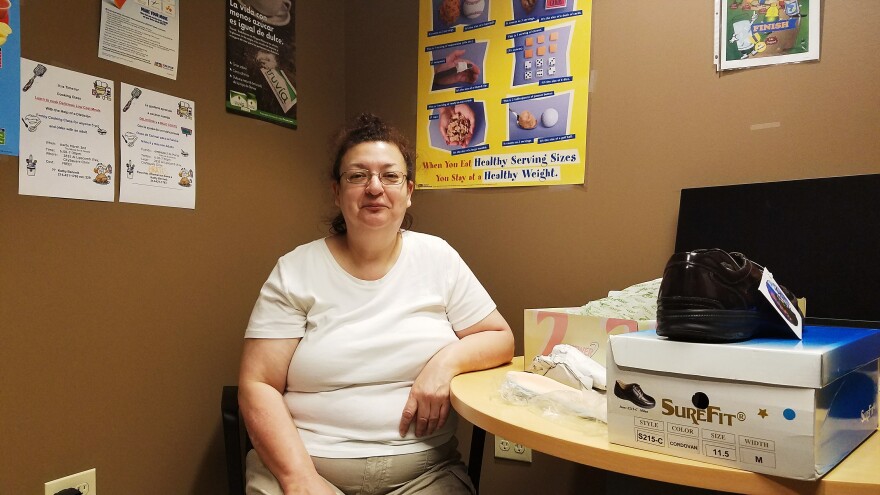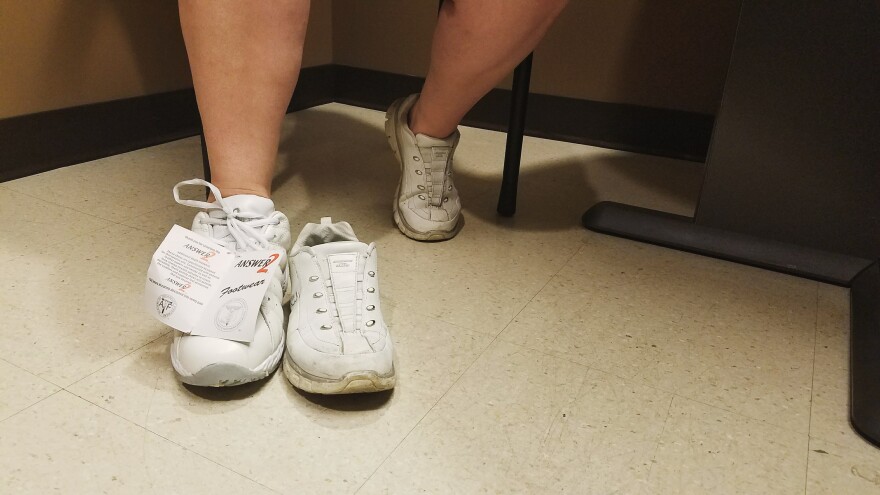Over the past month, Baylor Scott & White Health has been distributing free diabetic shoes to its uninsured, low-income patients to combat and prevent what doctors see as a diabetes crisis in North Texas. The shoe distribution is just one part of a Baylor program that takes its own medical surplus and gives them to the needy at home and abroad.
Baylor has 7,700 pairs of diabetic shoes to give away. One pair went to Rosa Montes, a 57-year-old Dallas resident who was diagnosed with diabetes roughly 10 year ago.
She first heard about the shoe distribution at the Baylor Community Clinic on Worth Street just north of Fair Park, where she gets care and meets with a diabetes instructor. She decided she needed a pair.
“I noticed that a lot of people that don’t have it have sores and have their feet hurting all the time,” Montes said. “They get blisters and they’re very hard for them to heal, so maybe these will benefit me not to get so [many] problems in the future.”
On the day of her pickup, Montes met with Shaila Delacruz, a community health worker in chronic disease education at the Baylor clinic. Delacruz wedged thick, foamy insoles into Montes’ brand new white leather sneakers and had her try them on.

Montes took just a few steps – and smiled.
“They’re nice,” she said.
“Do they feel comfortable?” Delacruz asked.
“Yes, they do,” Montes replied contently.
While diabetic shoes don’t look that different from regular shoes, they’re specially designed to accommodate orthotic devices, like Montes’ insoles. The shoes help reduce the risk of foot sores and ulcers, a condition that affects around 15 percent of patients with diabetes. If those wounds are left untreated, they can cause bone infections, or osteomyelitis.
Diabetic shoes aren’t cheap. Most run between $100 and $200. For Montes, who doesn’t have insurance and can’t work, shoes like these would typically be out of reach.
“I would’ve not known about them,” she said. “A lot of the shoes that are diabetic shoes are very expensive. Some of the medicines are too.”
“A lot of our patients, if they have to prioritize between food or gas money to get to work or other day-to-day needs, this is going to be lower on their list,” said Dr. Jeffrey Zsohar, the medical director for Baylor Community Care Clinics.
Nearly half a million people in Dallas County don’t have health insurance – one of the highest rates in the state. And Dallas has some of the highest rates of diabetes in the state as well. According to Baylor Scott & White, the Frazier neighborhood, also near Fair Park, is where those numbers are most concentrated. Residents in the surrounding ZIP codes are three times more likely to die from diabetes than those living elsewhere in Dallas. Zsohar said those numbers pose a challenge to doctors.
“Chronic diseases like diabetes, high blood pressure and others will often times go untreated. And when they finally do present to the hospital, the ERs or even the clinics, they have advanced diseases,” Zsohar said. “So, in controlling their diabetes, in lowering their blood sugar and getting them the right equipment, hopefully we can avoid those complications.”

The “right” equipment in this case – diabetic shoes – came from Baylor Health’s Faith in Action Initiatives, which recently received a large donation of shoes and other orthotic supplies. About half of those shoes stayed in the Dallas area – going to social service groups like City Square, other hospitals like Scottish Rite and to Baylor’s clinics. The other half were shipped off to needy communities in Honduras and Israel. Usually, Faith in Action distributes Baylor’s own excess medical supplies.
“One of those great secrets of life is that hospitals across America unfortunately waste a lot of supplies and equipment,” said Don Sewell, the director of Faith in Action.
The program takes depreciated or surplus items – like beds, stretchers, exam tables, gauze and tape – from Baylor’s 48 hospitals and 400 clinics and sends them to under-served areas locally and around the world. During the Ebola crisis, for instance, Baylor shipped several 40-foot containers of supplies to Liberia.
Private charities are doing similar work – like Project C.U.R.E in Denver, the Brother’s Brother Foundation in Pittsburgh, even Durable Medical Equipment Exchange in East Dallas. Sewell said though, there aren’t many hospitals themselves who run their own largescale donation program.
“We simply try to address unjust situations – whether it’s down the street from us here or on the other side of the world,” Sewell said. “The simple giving of a cup of cold water enlivens people; it provides for them to better engage in their own society; and I would say, ultimately, redounds into hope for our world.”
Here in Dallas, Rosa Montes was just glad to have a new pair of shoes – and hope for a healthier future.
“Other shoes don’t feel so good, but these are pretty nice,” she said.






